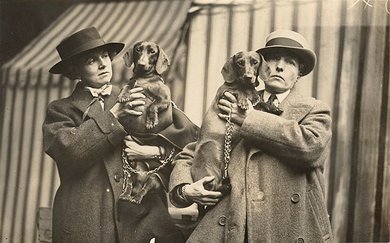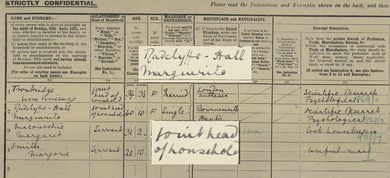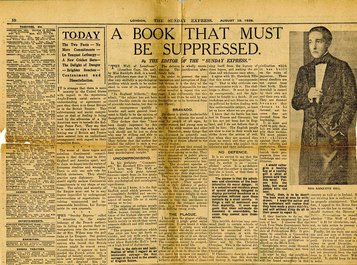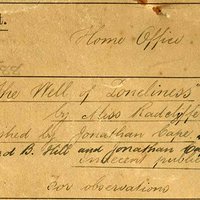Joint heads of household
Radclyffe Hall was an English poet and author, and is best known for her groundbreaking work in lesbian literature. Hall was a rarity in her lifetime, living relatively openly as a lesbian in an era that condemned such relationships. She was born Marguerite Radclyffe-Hall, but published under the name Radclyffe Hall and privately used the name John.
Hall herself identified with the contemporary phrase ‘congenital invert’, a term developed by people studying human sexuality at the turn of the century, used to describe an individual that is attracted to people of the same sex. In 1907 she met her first long-term partner, the singer Mabel Batten, and in 1915 Hall began an affair with sculptor Una Troubridge that would last for the rest of their lives.

Una Troubridge (left) and Radclyffe Hall with their dogs, 1923 (Wikimedia Commons, Public Domain)
Hall and Una are listed as living together in the 1921 Census. The pair uniquely listed themselves as ‘joint head of household’.

Hall’s 1921 Census record
The Well of Loneliness
Same-sex relationships between women, while not illegal in Britain, were widely disapproved of. In contrast, same-sex relationships between men were illegal. In this period the 1921 Criminal Law Amendment Act was discussed in Parliament, which could have meant the criminalisation of same-sex relationships between women.
The act was seriously considered but ultimately lesbian relationships were not criminalised, as many parliamentarians did not believe that women could have sexual relationships with other women. There was also a concern that criminalisation would lead to greater visibility of, and therefore an increase in, lesbian relationships.
In 1928, Hall's ground-breaking novel The Well of Loneliness was published. The novel chronicled the life of Stephen Gordon, a masculine lesbian who identifies as an ‘invert’. Not only did Hall love women, but she also dared to write publicly about love between women. She was protected to some extent by her wealth and status.
'A book that must be suppressed'
The book received a great deal of praise, however her sympathetic portrayal of lesbians attracted controversy.
In August 1928, James Douglas, editor of The Sunday Express and dedicated moralist, launched a scathing attack on Hall and her novel. In an editorial piece titled ‘A Book That Must Be Suppressed’, Douglas regarded the novel to be ‘an intolerable outrage’ and argued that,
the cleverness of the book intensifies its moral danger…The book must at once be withdrawn. I hope the author and the publishers will realise that they have made a grave mistake, and will without delay do all in their power to repair it
James Douglas, 1928

A press cutting from the Sunday Express about the book. Catalogue reference: DPP 1/88.
Destroyed for 20 years
Such reactions triggered an obscenity trial, which commenced on 9 November 1928. Throughout this period Hall lived with Una Troubridge.
The National Archives’ collections hold many records relating to this popular trial. Many famous faces were present at court – as was Radclyffe Hall herself.
Her book was on trial, but in many ways so was she and her relationship.
Ultimately the Chief Magistrate found the novel’s literary merit to be irrelevant, and ordered copies of the The Well of Loneliness to be destroyed. The novel was not published in the UK again for 20 years.
-

- From our collection
- DPP 1/88
- Title
- File on The Well of Loneliness obscenity trial from the Director of Public Prosecutions
- Date
- 1929
Iconic status
In 1943, Hall was diagnosed with cancer and died at the age of 63. Her body is buried in Highgate Cemetery, in the Batten family vault – the same place where Mabel, her earlier lover, is buried.
Despite the censorship case, Hall now has an iconic status in lesbian history, which may even have been aided by the publicity caused. Her cult status is a testament to her pioneering work.
